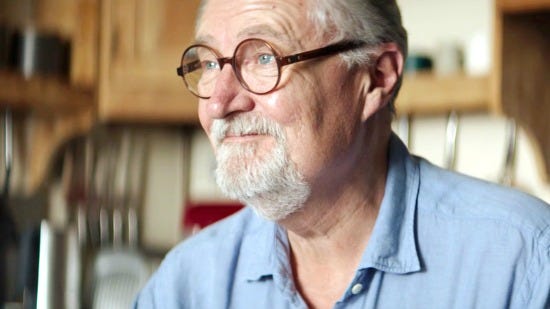The Sense of an Ending

Anthony Webster, as portrayed by Jim Broadbent, is an older gent playing out the string of a lonely life with a few untidy ends. “The Sense of an Ending,” based upon the novel by Julian Barnes, shows us Tony now and as a young man at university, and how he got to here from there.
It’s essentially a murder-mystery, as we puzzle out how he killed his younger self and became the man he is.
Tony wanted to be a poet but ended up running a tiny shop — literally the width of a closet — where he repairs and sells beautiful vintage cameras. He’s fussy and set in his ways; he is annoyed by actual customers and only opens up every day out of habit. Seems like the perfect sort of niche business to market on the Web, but Tony’s barely graduated to email.
He’s long divorced and still maintains a friendly / biting relationship with his ex-wife, Margaret (Harriet Walter). Their 36-year-old daughter, Susie (Michelle Dockery), has given up on men and is having a baby on her own. Tony affably (but somewhat grudgingly) ferries her to Lamaze classes, substitutes as coach and even chats up the lesbian couples.
Then a letter arrives in the email relating that he has been named in a will. After some confusion, he learns that the mother of an old girlfriend has bequeathed him a diary. And it’s not the mother’s diary, or the girlfriend’s, but belonged to his best friend from university, Adrian Finn. However, the girlfriend, Veronica, refuses to turn it over.
Director Ritesh Batra and screenwriter Nick Payne then shift back and forth to decades ago, where Billy Howle takes over the role of Tony. We meet Veronica (Freya Mavor), and eventually her parents and brother. The mother is played by Emily Mortimer, who is vibrant and flirty and a little bit sad. She looks at Tony in a way he wishes her daughter would.
Veronica is a mysterious young woman who takes great pleasure in remaining so. She loves to tease Tony and lead him on. She gives him his first camera, and photography starts to crowd out poetry. The relationship eventually falters.
Rather late in the movie we meet the modern Veronica, now played by Charlotte Rampling. Neither her beauty or her aura of deflection have faded. They meet, quarrel a bit about the diary, and she abruptly departs. Tony becomes obsessed with puzzling out this riddle that seems to have lain unexamined at the root of his life for so long.
Having not read the novel, I can only speculate as to what was left in and what was taken out. The examination of Tony’s friendship with Adrian (Joe Alwyn) feels skimped upon. Adrian is the standout genius of the class, who takes the tired lessons of their teachers, ties them into knots and throws them back in their faces.
Most movies these days could stand some degree of trimming in the editor’s bay, but “The Sense of an Ending” is the rare film that could stand to be longer.
It’s still an engaging personal journey, and Broadbent is in his usual fine form. It’s a contemplation on memory, which is really the story we tell ourselves about ourselves. Some are more impenetrable than others.



